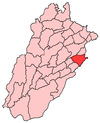Kasur
This article needs additional citations for verification. (November 2011) |
Kasur
قصُور | |
|---|---|
City | |
 The shrine of Bulleh Shah in central Kasur | |
 | |
| Country | Pakistan |
| Province | Punjab |
| District | Kasur District |
| Area | |
• Total | 3,995 km2 (1,542 sq mi) |
| Elevation | 218 m (715 ft) |
| Population (2007) | |
• Total | 288,181 |
| • Density | 595/km2 (1,540/sq mi) |
| Time zone | UTC+5 (PST) |
| Calling code | 049 |
Kasur or Qasur (Template:Lang-ur), (Punjabi: قصور), is the headquarters of Kasur District, Pakistan. It is the 20th most populous city of Pakistan.[1] Bordered to the north by Lahore, by India to the south and east, the city is adjacent to the border of Ganda Singh Wala, a border with its own flag-lowering ceremony similar to that of Wagah but far more intimate and less jingoistic. Kasur is also the burial place of the legendary Sufi-poet Bulleh Shah.
History

Kasur is named after Lord Rama's son Kusha and Lahore after Lava Kasur region was an agricultural region with forests during the Indus Valley Civilization. The Vedic period is characterized by Indo-Aryan. The Kambojas, Daradas, Kaikayas, Pauravas, Yaudheyas, Malavas and Kurus ruled the ancient Punjab region. After overrunning the Achaemenid Empire in 331 BCE, Alexander marched into the present-day Punjab region with an army of 50,000. The Kasur region was ruled variously by the Maurya Empire, Indo-Greek kingdom, Kushan Empire, Gupta Empire, White Huns, Kushano-Hephthalites and Hindu Shahi kingdoms.
In 997 CE, Mahmud of Ghazni, took over the Ghaznavid dynasty empire established by his father, Sultan Sebuktegin. In 1005 he conquered the Shahis in Kabul, and followed it by the northern region around modern-day Kasure. The Delhi Sultanate and later Mughal Empire and later Afghan empire ruled the Kasur region. Kasur was established as a city by Kheshgi tribe of Pashtuns who had migrated to the region, during the reign of Babar and built several small forts in the area.[2] During this time, the Punjab region became predominantly Muslim due to missionary Sufi saints. Under Mughal rule, the city flourished and was notable for commerce and trade. It became the home of the legendary Sufi saint and celebrated poet, Bulleh Shah, who is buried in a large shrine in the city.
After the decline of the Mughal Empire, the Sikh reocuppied Kasur in 1807. During the British Raj, the irrigation canals were built that irrigated large areas of the Kasur District. The predominantly Muslim population supported the Muslim League and the Pakistan Movement. After the independence of Pakistan in 1947, the minority Hindus and Sikhs were to migrate to India while the Muslim Muhajir people, migrated from India and settled in Kasur.
Language
- Punjabi,
- Urdu, being the national language of Pakistan is universally spoken and understood, while English is also understood and spoken by many people.famous singer Ustad Bade Ghulam Ali Khan was also from kasur gharana of Indian classical music.
Notable people
- Bulleh Shah, a Sufi saint and spiritual poet
- Hafiz Ghulam Murtaza, teacher of Bulleh Shah and Waris Shah
- Noor Jehan, singer and actress
- Basit Jehangir Sheikh, former Member of Provincial Assembly
- Malik Meraj Khalid former Speaker of National Assembly of Pakistan, former Prime Minister of Pakistan
- Ahmad Raza Khan Kasuri, former member of National Assembly of Pakistan
- Irshad Ahmed Haqqani, journalist, writer
- Phool Muhammad Khan, politician
- Rana Muhammad Iqbal Khan current speaker punjab assembly
- Aseff Ahmad Ali, former Foreign Minister
- Khurshid Mahmud Kasuri, former Foreign Minister
- Bakhtiar Mahmud Kasuri, politician and founding member of PTI
- Bade Ghulam Ali Khan, a Hindustani classical vocalist
- Barkat Ali Khan, a Hindustani classical vocalist
- Pran Kumar Sharma, an Indian cartoonist
- Najam Sethi, journalist, writer
- Abdul Hamid, former Auditor General of Pakistan
- Tahir Aslam Gora, a Canadian editor and publisher
- Sardar Arif Nakai, former Chief Minister of Punjab
- Sardar Muhammad Asif Nakai, Member of the Punjab Provincial Assembly
- Jagga Jatt, 20th century rebel of Punjab
- Maharani Datar Kaur, Wife of Maharajah Ranjit Singh
- Fateh Muhammad Sial
Agriculture
The main crops in Kasur are wheat, corn, Rice, potato, sugar cane and turmeric. Allahabad(Thengmor) The biggest wheat and rice market in Punjab, there are 70 rice sheller in the area. Turmeric fields of Chhanga Manga and Talwandi, Noor Pur are unique agricultural features of Pakistan.

